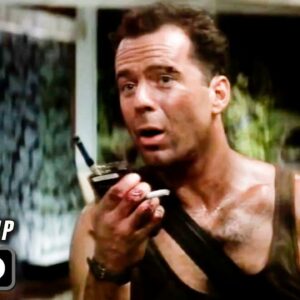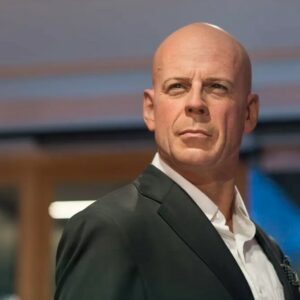Introduction to the Film and Character
Released in 2013, World War Z is a post-apocalyptic thriller directed by Marc Forster, based on Max Brooks’ novel of the same name. The film stars Brad Pitt as Gerry Lane, a former United Nations investigator who is thrust into the global crisis when a zombie outbreak threatens the existence of humanity. The film follows Lane’s race against time to uncover the source of the epidemic, while protecting his family and trying to halt the relentless spread of the infection.
At the beginning of World War Z, Gerry is a family man, a man of peace, and an experienced negotiator. He is not a soldier, and he is not prepared for the horrors he is about to face. The outbreak of the zombie pandemic — a seemingly unstoppable force that moves faster than any known military response — forces Gerry to undergo a psychological transformation that fundamentally alters his understanding of survival and heroism. What follows is a journey of emotional and mental upheaval that challenges his perceptions of fear, sacrifice, and ultimately, his role in saving the world.
The Psychological Transformation of Gerry Lane
From the opening scenes of World War Z, Gerry Lane is a man of quiet strength and familial devotion. He is initially depicted as a loving father and husband, living in a world that seems stable and predictable. However, once the zombie outbreak begins, this stability is shattered, and the audience witnesses the beginning of Gerry’s psychological transformation.
In the early stages of the film, Gerry is overwhelmed by fear and desperation. As the initial chaos of the outbreak unfolds, Gerry’s survival instincts are put to the test. This fear is not only for his life but for the safety of his wife, Karin (Mireille Enos), and their two young daughters. The terror he feels is palpable: the speed at which the zombies spread, the sheer magnitude of the epidemic, and the powerlessness that comes with such a global disaster. During this period, Gerry is not a hero but an ordinary man facing extraordinary circumstances, struggling to find his place in a rapidly deteriorating world.
However, as the film progresses, Gerry’s fear begins to morph into resilience. This shift is not instantaneous; rather, it occurs in stages as he confronts the realities of the outbreak. Early on, he is reactive, trying to outrun the zombies and seeking refuge in whatever safe spaces he can find. But as he witnesses the devastation that the outbreak causes — entire cities falling, nations collapsing, governments failing — Gerry’s psychological state begins to change. He is no longer a passive survivor but an active participant in the global effort to find a solution to the crisis. His initial fear is replaced with a determination to protect his family and, ultimately, to stop the global destruction.
One of the most profound changes in Gerry’s psyche occurs when he is tasked with a mission that seems impossible: to find the source of the zombie virus and develop a way to stop its spread. This mission is not only a test of his physical endurance but also a challenge to his emotional resilience. The film explores Gerry’s internal conflict as he is forced to confront his deepest fears and make difficult moral decisions in the face of an apocalypse.
Key Milestone Scene: The Turning Point
One of the most significant psychological milestones in Gerry Lane’s transformation occurs when he arrives in Jerusalem, a city that has been quarantined in an attempt to contain the spread of the zombie infection. This is a crucial turning point in the film, as it marks Gerry’s shift from a passive observer to an active participant in the global effort to combat the outbreak.
In Jerusalem, Gerry learns that the city’s residents have managed to delay the spread of the zombies by building high walls and using an elaborate system of defense. However, the peace is short-lived. The zombies, seemingly unstoppable, breach the city’s defenses, leading to a violent and bloody outbreak that forces Gerry to flee. This sequence is critical in Gerry’s transformation because it serves as the catalyst for his decision to embrace his new role as a key player in the global effort to fight the zombie pandemic.
The scene also acts as a turning point in the broader narrative of World War Z. Gerry’s growing awareness of the scale and gravity of the crisis propels the story forward, and the moment when he decides to take action — to seek a solution and to make difficult choices — represents a psychological turning point for both the character and the audience. It is in Jerusalem that Gerry fully understands the personal and global stakes involved in his mission, and he begins to shed his earlier passivity and embrace the role of the hero.
Symbolism and Emotional Impact
The Jerusalem sequence not only marks a turning point for Gerry but also carries significant symbolic weight. The city, once a symbol of hope and refuge, quickly becomes a symbol of the fragility of human civilization. The walls that were meant to protect the citizens are breached, just as the veneer of societal order is shattered by the zombie outbreak. This destruction represents the collapse of the old world and the beginning of a new, harsher reality.
For Gerry, the emotional impact of this scene is immense. The chaos in Jerusalem forces him to confront his deepest fears: the loss of his family, the collapse of society, and the overwhelming sense of helplessness that comes with facing an apocalypse. As the city falls around him, Gerry is faced with a stark choice: to survive at any cost or to actively seek a solution that could end the global crisis. His decision to act rather than merely survive marks the beginning of his transformation into a man of action, a symbol of hope in the face of an impossible situation.
The emotional weight of this scene is further amplified by Gerry’s internal struggle. As he witnesses the devastation and the death toll rising, Gerry grapples with his sense of responsibility. His family is still at risk, and the weight of that responsibility weighs heavily on him. The Jerusalem sequence is a moment of reckoning, where Gerry realizes that his journey is no longer just about survival but about making a difference in the face of a global disaster.
The symbolism of the Jerusalem sequence — the fall of a city that represents hope and order, the loss of control, and the vulnerability of human civilization — is mirrored in Gerry’s emotional journey. The city’s collapse forces him to confront his role in the larger narrative of survival, and in doing so, he sheds his fear and embraces his newfound sense of purpose. This transformation is not only central to Gerry’s character arc but also reflects the broader theme of human resilience in the face of overwhelming adversity.
Conclusion and Reflection
The psychological growth of Gerry Lane is central to the narrative arc of World War Z. His journey from fear and desperation to resilience and determination serves as a powerful reminder of the capacity for psychological transformation in the face of extreme challenges. Gerry’s evolution reflects the broader theme of human resilience: the ability to adapt, to overcome, and to find meaning and purpose in a world that has been upended by disaster.
The emotional weight of Gerry’s transformation is felt not only by the character himself but also by the audience. As Gerry transitions from a passive survivor to an active participant in the global effort to stop the zombie outbreak, the audience witnesses the power of psychological growth and the importance of making choices in times of crisis. Gerry’s journey is one of personal sacrifice, moral complexity, and ultimate redemption, offering a deeply emotional exploration of what it means to survive in a world that is falling apart.
In the context of the film, Gerry’s transformation is not just about the survival of an individual but also about the survival of humanity itself. By embracing his role in the fight against the zombie pandemic, Gerry demonstrates the strength of the human spirit and the capacity for psychological growth, even in the face of unimaginable adversity. This theme resonates deeply with audiences, who are reminded that in times of crisis, it is not just physical strength that is needed, but emotional and psychological resilience.
Ultimately, World War Z is not just a story about zombies, but about the emotional and psychological journey of a man who must rise above his fear and find the strength to act in the face of the end of the world. Gerry Lane’s transformation from a man of fear to a man of action serves as the heart of the film, providing both a narrative drive and an emotional anchor that resonates long after the credits roll.





